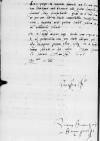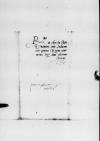Gratissimae mihi fuerunt Reverendissimae Dominationis Vestrae cf. Ioannes DANTISCUS to Seweryn BONER 1545-12-01 — 1546-01-16, CIDTC IDL 7357, letter lost⌊litteraecf. Ioannes DANTISCUS to Seweryn BONER 1545-12-01 — 1546-01-16, CIDTC IDL 7357, letter lost⌋, quibus, cum pro humanitate sua me intervisere, tum de prospera valetudine sua certiorem me reddere dignata est. De qua et Reverendissimae Dominationi Vestrae gratulor et quod parem mihi optet, plurimam habeo gratiam, simul autem opto, ut et salubritatem istam diu semperque Reverendissimae Dominationi Vestrae indulgeat Dominus, et eius tam illustribus de mea votis idem annuat invisumque istum podagrae morbum, quo iam supra duos menses distineor, tandem depellat.
Gratum etiam fuit cognoscere ista, quae Reverendissima Dominatio Vestra perscripsit mihi nova, in quibus, quod scire requirit, vera ne sint, quae de Charles V of Habsburg (*1500 – †1558), ruler of the Burgundian territories (1506-1555), King of Spain as Charles I (1516-1556), King of Naples and Sicily, King of the Romans (1519-1530), Holy Roman Emperor of the German Nation (elected 1519, crowned 1530, abdicated 1556); son of Philip I the Handsome and Joanna the Mad of Castile⌊caesareCharles V of Habsburg (*1500 – †1558), ruler of the Burgundian territories (1506-1555), King of Spain as Charles I (1516-1556), King of Naples and Sicily, King of the Romans (1519-1530), Holy Roman Emperor of the German Nation (elected 1519, crowned 1530, abdicated 1556); son of Philip I the Handsome and Joanna the Mad of Castile⌋, de Heinrich II of Braunschweig-Wolfenbüttel der Jüngere (*1489 – †1568), 1514-1568 Duke of Braunschweig-Lüneburg⌊duce BrawnswicensiHeinrich II of Braunschweig-Wolfenbüttel der Jüngere (*1489 – †1568), 1514-1568 Duke of Braunschweig-Lüneburg⌋ et aliis rebus gestis ferantur. De Charles V of Habsburg (*1500 – †1558), ruler of the Burgundian territories (1506-1555), King of Spain as Charles I (1516-1556), King of Naples and Sicily, King of the Romans (1519-1530), Holy Roman Emperor of the German Nation (elected 1519, crowned 1530, abdicated 1556); son of Philip I the Handsome and Joanna the Mad of Castile⌊caesareCharles V of Habsburg (*1500 – †1558), ruler of the Burgundian territories (1506-1555), King of Spain as Charles I (1516-1556), King of Naples and Sicily, King of the Romans (1519-1530), Holy Roman Emperor of the German Nation (elected 1519, crowned 1530, abdicated 1556); son of Philip I the Handsome and Joanna the Mad of Castile⌋ et aliis equidem comperti habeo nihil, sed de Heinrich II of Braunschweig-Wolfenbüttel der Jüngere (*1489 – †1568), 1514-1568 Duke of Braunschweig-Lüneburg⌊duce BrawnswicensiHeinrich II of Braunschweig-Wolfenbüttel der Jüngere (*1489 – †1568), 1514-1568 Duke of Braunschweig-Lüneburg⌋ eiusque filio per Philip I of Hesse der Großmütige (*1504 – †1567), 1509-1567 Landgrave of Hesse, actually in power from 1518; son of Wilhelm II of Hesse and Anna of Mecklenburg-Schwerin, married to Christine of Saxony (daughter of Georg, Duke of Saxony), protector of the Protestant Reformation and one of the most important of the early Protestant rulers in Germany, one of the leaders of the Schmalkaldic League (taken prisoner by emperor Charles V of Habsburg after the defeat at Mühlberg in 1547, but released in 1552) (ADB, 25, p. 765-783)⌊land written over g⌈gdd written over g⌉gravium HassiaePhilip I of Hesse der Großmütige (*1504 – †1567), 1509-1567 Landgrave of Hesse, actually in power from 1518; son of Wilhelm II of Hesse and Anna of Mecklenburg-Schwerin, married to Christine of Saxony (daughter of Georg, Duke of Saxony), protector of the Protestant Reformation and one of the most important of the early Protestant rulers in Germany, one of the leaders of the Schmalkaldic League (taken prisoner by emperor Charles V of Habsburg after the defeat at Mühlberg in 1547, but released in 1552) (ADB, 25, p. 765-783)⌋ captis nihil est certius: horum adeo causa indixere sibi protestantes sive ii, qui sunt Schmalkaldic League ⌊ligae SmalckhaldensisSchmalkaldic League ⌋ principes, conventum Frankfurt an der Oder (Francofurtum ad Oderam, Traiectum ad Viadrum), city in eastern Germany, Brandenburg, seat of university Alma Mater Viadrina founded by Joachim I Nestor Elector of Brandenburg in 1506⌊Francfordiae ad OderamFrankfurt an der Oder (Francofurtum ad Oderam, Traiectum ad Viadrum), city in eastern Germany, Brandenburg, seat of university Alma Mater Viadrina founded by Joachim I Nestor Elector of Brandenburg in 1506⌋ agendum, eoque illos captivos adduci debere, ut ex eis sciscitentur, quorum ope consilioque tantum bellum concitaverint; suspectos autem habent principes utriusque ordinis monarchas.
De nostro Diet of Poland ⌊conventuDiet of Poland ⌋ nihil sane est nunc, quod Reverendissimae Dominationi Vestrae scribam, quin id ex aliis Reverendissima Dominatio Vestra abunde cognitum habeat. Quod autem ad terrarum nuntios attinet, quos clamaturos esse, ut Inhabitants of Royal Prussia ⌊PruteniInhabitants of Royal Prussia ⌋ ad eadem, quibus hoc Poland (Kingdom of Poland, Polonia)⌊RegnumPoland (Kingdom of Poland, Polonia)⌋tenetur, onera cogantur, Reverendissima Dominatio Vestra accepit, haud novum iam est  BCz, 1599, p. 638 hoc. Quippe et superiores Diet of Poland ⌊conventusDiet of Poland ⌋ cum Cracow (Kraków, Cracovia), city in southern Poland, Małopolska, on the Vistula river, from 1038 capital of the Kingdom of Poland⌊hicCracow (Kraków, Cracovia), city in southern Poland, Małopolska, on the Vistula river, from 1038 capital of the Kingdom of Poland⌋ ante annum hidden by binding⌈[m]m hidden by binding⌉, tum Piotrków (Petricovia), city in central Poland, in the 15th-16th century the location of the assemblies of the Diet (Sejm) of the Kingdom of Poland, today Piotrków Trybunalski⌊PeterkoviaePiotrków (Petricovia), city in central Poland, in the 15th-16th century the location of the assemblies of the Diet (Sejm) of the Kingdom of Poland, today Piotrków Trybunalski⌋ ante biennium acti, iisdem clamoribus pleni hidden by binding⌈[leni]leni hidden by binding⌉ fuerunt itaque dissolvebantur.
BCz, 1599, p. 638 hoc. Quippe et superiores Diet of Poland ⌊conventusDiet of Poland ⌋ cum Cracow (Kraków, Cracovia), city in southern Poland, Małopolska, on the Vistula river, from 1038 capital of the Kingdom of Poland⌊hicCracow (Kraków, Cracovia), city in southern Poland, Małopolska, on the Vistula river, from 1038 capital of the Kingdom of Poland⌋ ante annum hidden by binding⌈[m]m hidden by binding⌉, tum Piotrków (Petricovia), city in central Poland, in the 15th-16th century the location of the assemblies of the Diet (Sejm) of the Kingdom of Poland, today Piotrków Trybunalski⌊PeterkoviaePiotrków (Petricovia), city in central Poland, in the 15th-16th century the location of the assemblies of the Diet (Sejm) of the Kingdom of Poland, today Piotrków Trybunalski⌋ ante biennium acti, iisdem clamoribus pleni hidden by binding⌈[leni]leni hidden by binding⌉ fuerunt itaque dissolvebantur.
Quod tamen Reverendissima Dominatio Vestra a me petiit hidden by binding⌈[etiit]etiit hidden by binding⌉, ne pro meo loco in Royal Council of Poland ⌊senatuRoyal Council of Poland ⌋ immunitatibus Royal Prussia (Prussia Regalis), region, part of Prussia annexed to the Kingdom of Poland in 1466 under the provisions of the Second Peace of Thorn⌊terrarum PrussiaeRoyal Prussia (Prussia Regalis), region, part of Prussia annexed to the Kingdom of Poland in 1466 under the provisions of the Second Peace of Thorn⌋ ab hidden by binding⌈[ab]ab hidden by binding⌉essem, quantum mihi quidem licebit petitioni Reverendissimae Dominationis Vestrae hidden by binding⌈[Vestrae]Vestrae hidden by binding⌉ me accommodabo libenter.
Reverendissimam Dominationem Vestram impense rogo, tueatur suam erga me gratiam hidden by binding⌈[tiam]tiam hidden by binding⌉ et ad promerendam eam meo utatur obsequio, quod illi sine hidden by binding⌈[sine]sine hidden by binding⌉ ulla exceptione pronum offero optoque Reverendissimam Dominationem Vestram in hidden by binding⌈[n]n hidden by binding⌉]columem feliciter ac diu valere.
 BCz, 1599, p. 638 hoc. Quippe et superiores
BCz, 1599, p. 638 hoc. Quippe et superiores 

